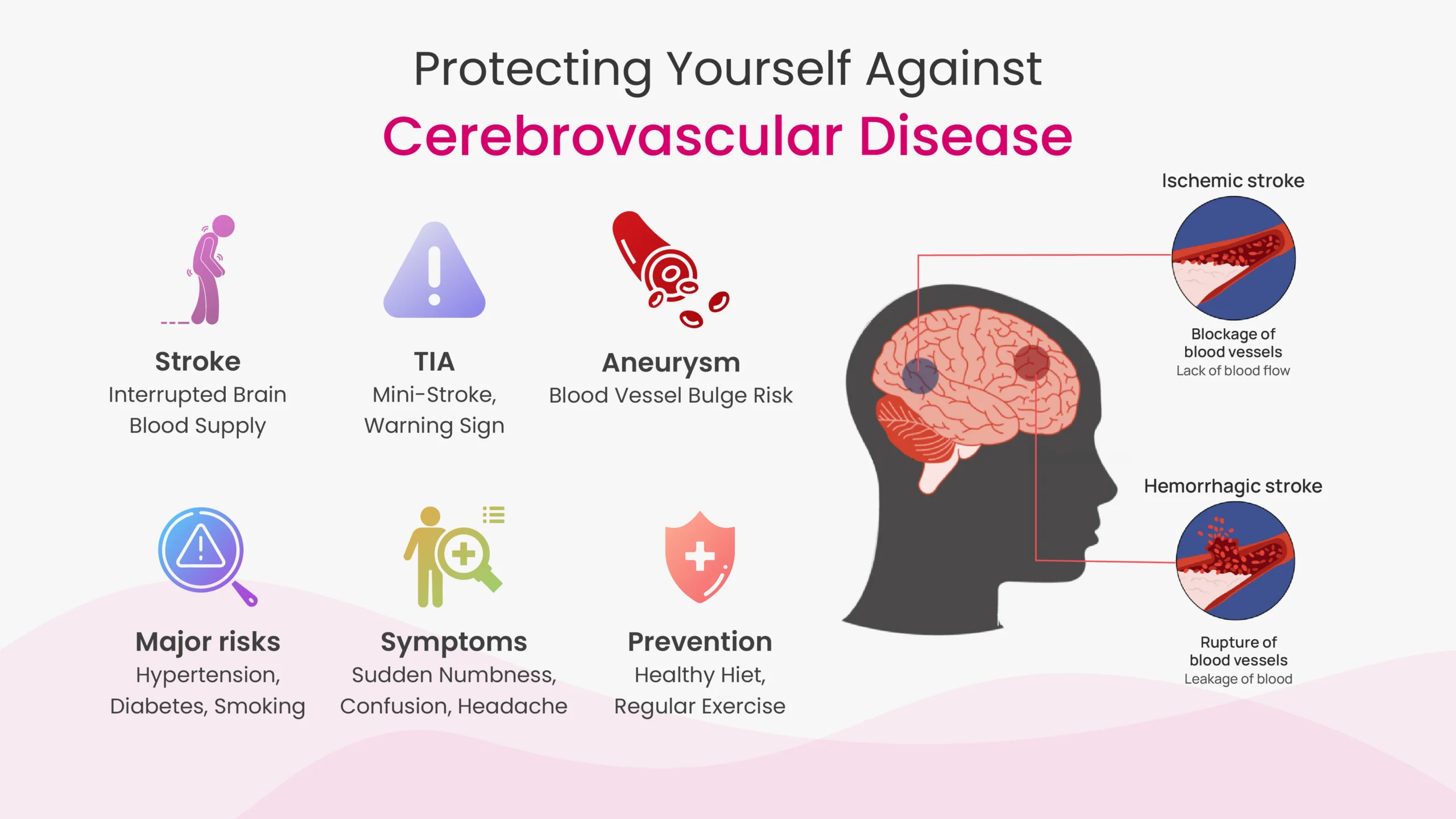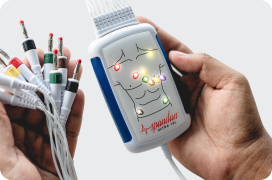
Author:- Mr. Ritesh Sharma
When we speak of the major heart health concerns globally, cerebrovascular disease ranks very high on the list. The term cerebrovascular disease is a generic term used to describe a variety of Human heart problems associated with blood vessels and the supply of blood to the brain. The most common conditions that we link with cerebrovascular disease are stroke, transient ischemic attack (TIA), and aneurysms. All these conditions can take a serious toll on your heart health and put you in a state of long-term disability. Moreover, sometimes, these conditions also turn out to be fatal for individuals.
Therefore, having a basic understanding of cerebrovascular disease is important to ensure the optimal state of your heart health. While cerebrovascular disease is indeed a great threat to your heart, you can steer clear of it if you are a heart-smart individual. Taking good care of your heart and opting for all preventive measures will ensure the immaculate state of your heart and cerebrovascular disease will not be able to reach even its periphery.
However, preventing cerebrovascular disease is much trickier than it appears. You must have complete knowledge of it whether you are a general audience or a clinician. Therefore, we have shared all relevant information pertaining to cerebrovascular disease in this blog. By reading this blog, you will be educated about this life-threatening disease and be able to ensure the immaculate state of your heart.
Understanding Cerebrovascular Disease
As we have mentioned earlier, the cerebrovascular disease is extremely vast in its scope. It encompasses a variety of heart problems that pose a great risk to your cardiovascular system. Let’s learn about these conditions one-by-one in detail:
- Stroke: This occurs when the blood supply to part of the brain is interrupted or reduced, preventing brain tissue from getting oxygen and nutrients. Brain cells begin to die within minutes.
- Transient Ischemic Attack (TIA): Often called a mini-stroke, a TIA occurs when the blood flow to the brain is temporarily disrupted. Symptoms are similar to a stroke but typically last only a few minutes and cause no permanent damage. However, a TIA is a warning sign of a future stroke.
- Aneurysm: An aneurysm is a bulge in a blood vessel caused by a weakness in the blood vessel wall. Aneurysms can occur in any blood vessel but are most common in the aorta and the brain. If an aneurysm bursts, it can cause life-threatening bleeding.
Risk Factors for Cerebrovascular Disease
There are different risk factors that can potentially trigger cerebrovascular disease. Some of these risk factors are eerily common, such as age, sedentary lifestyle, and family history. Whereas, other risk factors are elusive for individuals with conditions such as hypertension, diabetes, etc. More details regarding these risk factors are as follows:
- Hypertension (High Blood Pressure): The most significant risk factor. High blood pressure damages blood vessels over time.
- Diabetes: Increases the risk of cerebrovascular disease as high blood sugar levels can damage blood vessels.
- Smoking: Damages the cardiovascular system and significantly increases the risk of stroke.
- High Cholesterol: Leads to the buildup of plaques in blood vessels, which can obstruct blood flow and result in conditions such as heart palpitations, cardiac arrhythmias, and stroke in the category of cerebrovascular disease.
- Obesity: Increases the risk of hypertension, diabetes, and high cholesterol.
- Sedentary Lifestyle: Lack of physical activity can contribute to obesity, hypertension, and other risk factors.
- Age: The risk of cerebrovascular disease increases with age.
- Family History: A family history of stroke or heart disease can increase your risk.
Recognizing the Symptoms
Early recognition of symptoms is crucial for timely treatment and minimizing damage. Common symptoms of stroke and TIA include:
- Sudden numbness or weakness in the face, arm, or leg, especially on one side of the body.
- Sudden confusion, trouble speaking, or understanding speech.
- Sudden trouble seeing in one or both eyes.
- Sudden trouble walking, dizziness, loss of balance, or lack of coordination.
- Sudden severe headache with no known cause.
If you experience any of these symptoms, seek medical attention immediately.
Preventive Measures
While some risk factors like age and family history cannot be changed, many lifestyle adjustments can significantly reduce the risk of cerebrovascular disease.
Maintain Healthy Blood Pressure
High blood pressure is the leading cause of stroke. To manage your blood pressure:
- Monitor Regularly: Regular monitoring helps keep track of your blood pressure levels.
- Diet: Reduce salt intake, eat plenty of fruits and vegetables, and avoid saturated fats.
- Exercise: Engage in regular physical activity, such as walking, cycling, or swimming.
Control Diabetes
If you have diabetes, managing your blood sugar levels is crucial. This can be achieved through:
- Medication: Take prescribed medications regularly.
- Diet: Follow a balanced diet with controlled carbohydrate intake.
- Regular Check-ups: Monitor your blood sugar levels and have regular check-ups with your healthcare provider.
Quit Smoking
Smoking is a significant risk factor for cerebrovascular disease. Quitting smoking can drastically reduce your risk. Seek support through:
- Counseling: Professional counseling or support groups can help you quit.
- Medications: Nicotine replacement therapy and prescription medications can aid in quitting.
Manage Cholesterol Levels
High cholesterol leads to plaque buildup in arteries, increasing stroke risk. To manage cholesterol:
- Diet: Avoid trans fats and consume omega-3 fatty acids found in fish.
- Medications: Statins and other medications can help manage cholesterol levels.
- Regular Exercise: Helps increase HDL (good) cholesterol and decrease LDL (bad) cholesterol.
Maintain a Healthy Weight
Obesity is a risk factor for many health conditions, including cerebrovascular disease. To maintain a healthy weight:
- Balanced Diet: Eat a diet rich in whole grains, fruits, vegetables, and lean proteins.
- Physical Activity: Aim for at least 150 minutes of moderate aerobic activity or 75 minutes of vigorous activity each week.
Limit Alcohol Consumption
Excessive alcohol intake can increase blood pressure and contribute to obesity. Limit alcohol intake to moderate levels, which is up to one drink per day for women and up to two drinks per day for men.
Stay Active
A sedentary lifestyle is a major risk factor for many diseases. Regular physical activity helps:
- Improve cardiovascular health: Reduces blood pressure and cholesterol levels.
- Maintain a healthy weight: Helps prevent obesity and related conditions.
In conclusion, cerebrovascular disease can be dangerous for individuals for numerous reasons. However, with good care of your heart, you can mitigate its risks effectively. Keep in mind that this disease will only affect you if you take your heart health for granted. So, please don’t do that. Stay vigilant, stay heart-smart, and ensure that your cardiovascular health keeps thriving for many years to come.




